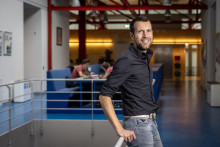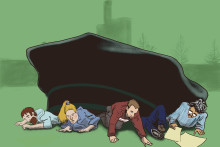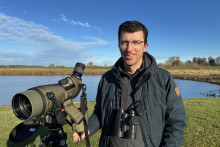The certificate attesting to his recently acquired title of ‘Teacher of the Year’ adorns his desk in the De Horst building. He feels the recognition that the award has brought him. ‘I’m receiving an avalanche of congratulations and compliments, but the award doesn’t only bring recognition. It also comes with an obligation. Now I have a podium, I want to communicate my vision even more strongly. We all need to realise that the university is there to educate students. Without education, you’re not a university but a research institute.’
At UT, education has been subordinated to research, he says. ‘We’re assessed on our papers and research results, not on our efforts in the area of education. Those could also be measured, for instance by the number of students we teach or supervise in final projects. Those aspects currently play a secondary role. How we can even things out? By introducing more equality into assessments, when it comes to research and education.’
‘Now I have a podium, I want to communicate my vision even more strongly’
Learning to study
Horstman puts a lot of energy into education that is highly attuned to the students. He’s responsible for the first module in the Bachelor of Civil Engineering. When students first arrive at UT, he helps them so they can find their own way. ‘I teach them the basics of water management, but above all invest a lot of time into guiding students through their first steps in getting to know our academic system, as well as each other. They have to learn how studying works, how UT works and how they can collaborate with their fellow students.’ Horstman gives the example of a workshop he introduced a few years ago to make students more aware of diversity and inclusion. ‘Too little attention was being paid to the integration of our international students. During the workshop, students shared personal experiences that were the result of a lack of inclusivity, also within UT.’ The workshop was taught faculty-wide the year after, and has now been integrated into the education programme.

But there are other inspiring examples, says Horstman. ‘The marks obtained by first-year students in the mathematics subject showed us that their prior knowledge wasn’t always sufficient. That’s why I contributed to an initiative of our mathematics teachers to set up a bridge course, which we first introduced at Civil Engineering last year. This way, we create a bridge to the mathematics lectures that are taught in our module.’
Students need to be challenged, Horstman believes. That’s why, for example, he visited the province of Friesland with students two weeks ago, in the context of ‘Building with nature’. ‘Together, we looked at the possibilities of using nature for coastal improvement. The Wetterskip Fryslân water authority showed us how it integrates salt marshes into its coastal defence. I think such excursions are important. I vividly remember going to Ameland as a student to discover the dynamics of a sandbank together with other students. Those are memories that last a lifetime.’
There were also monkeys there. I hate monkeys’
Crocodiles and monkeys
Speaking of memories, after graduating from UT Horstman joined the Singapore-Delft Water Alliance, a large consortium that researched water and the environment in Singapore. ‘My research was on the dynamics of mangrove forests. As part of that, one of the things I did as a PhD candidate is take field measurements in Thailand. Was it nice to be in Thailand and Singapore? Sure, but it was also pretty taxing! The days were long and our feet would often sink deeply into the mud of the mangrove forests. It was physically challenging. And there are snakes and crocodiles in the mangroves. And monkeys, there were also monkeys there. I hate monkeys. They would surround us while we were doing our fieldwork and look at us with their upper lips raised and their teeth bared. The only thing we could do is walk into the sea and wait for the monkeys to leave. Once they did, we’d have to get our things together again and start the process of installing our measuring instruments all over.’
Importance for ecosystem
Mangrove forests, which are situated between land and sea, are of great importance. ‘They form a natural protection against floods. They can dampen waves and reinforce the soil. In places that have mangrove forests, there is less erosion and less damage to the coast during storms’, he explains. ‘Dykes protect us from floods more effectively, but dykes must also be maintained and repaired and that costs a lot of money. Mangrove forests have natural resilience, they adapt to changes in their environment. For example, they can grow in sync with rising sea levels, as long as they don’t have to grow too fast and there is a sufficient supply of mud. Mangrove forests also have many other advantages for humans and nature. It has been demonstrated, for instance, that mangrove forests are up to ten times more effective in storing carbon than tropical rainforests.’

So, many advantages. Unfortunately, however, mangrove forests have been reduced by about 35 percent in the period of 1980 to 2000 alone, Horstman says. ‘Mangrove forests have never been that appreciated. Aquaculture, urban development, tourism and forestry were given priority. This had negative consequences for the entire ecosystem. I’m happy to say that this is now changing again and mangroves are currently being replanted.’
‘It would be great if the world became a bit greener and more resilient’
Lot to do
There’s still a lot to do, says Horstman. There are plenty of challenges relating to the sustainable protection of our coastal areas. ‘That’s what I would like to contribute to with my research. It would be great if the world became a bit greener and more resilient. And if people living by the coast could feel safe.’
He once again stresses the importance of the combination of research and education. ‘If I were to quit my research, the education I provide would be a lot more boring. And through my education activities, I can train a new generation of engineers who are more mindful of nature. For me, education and research are inextricably linked.’







